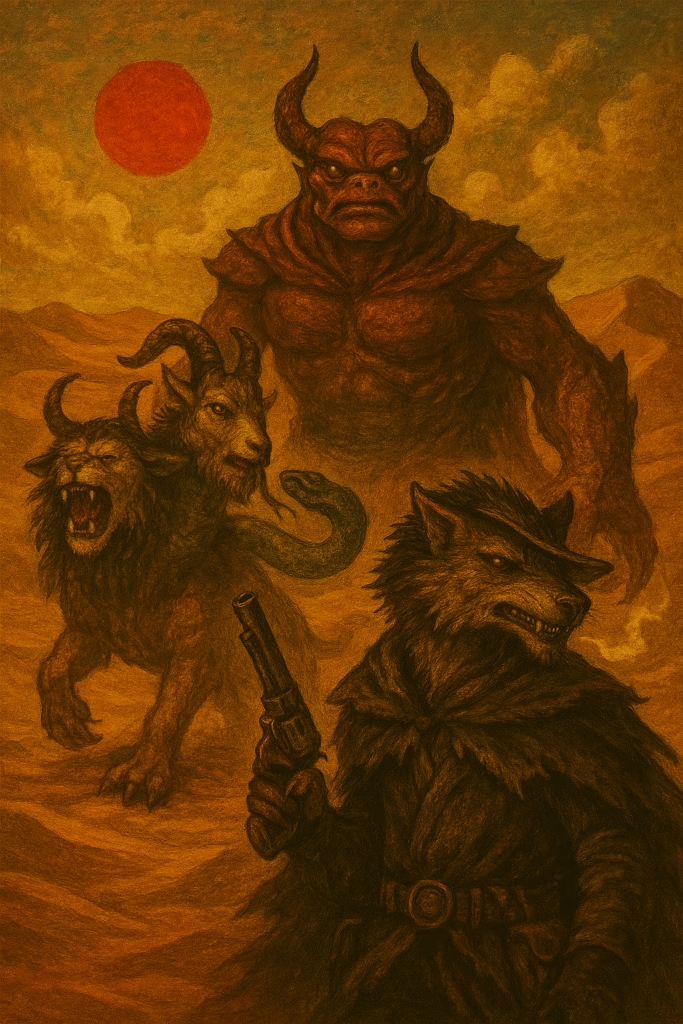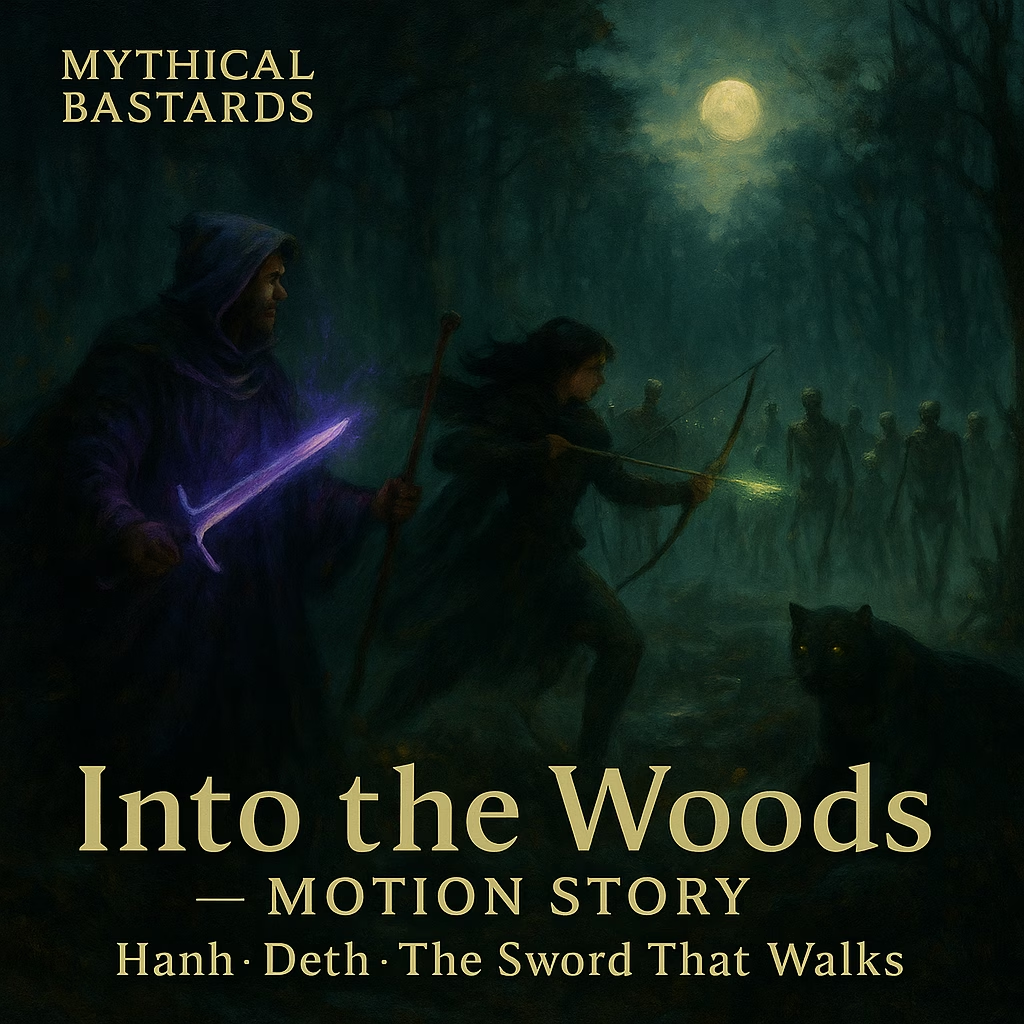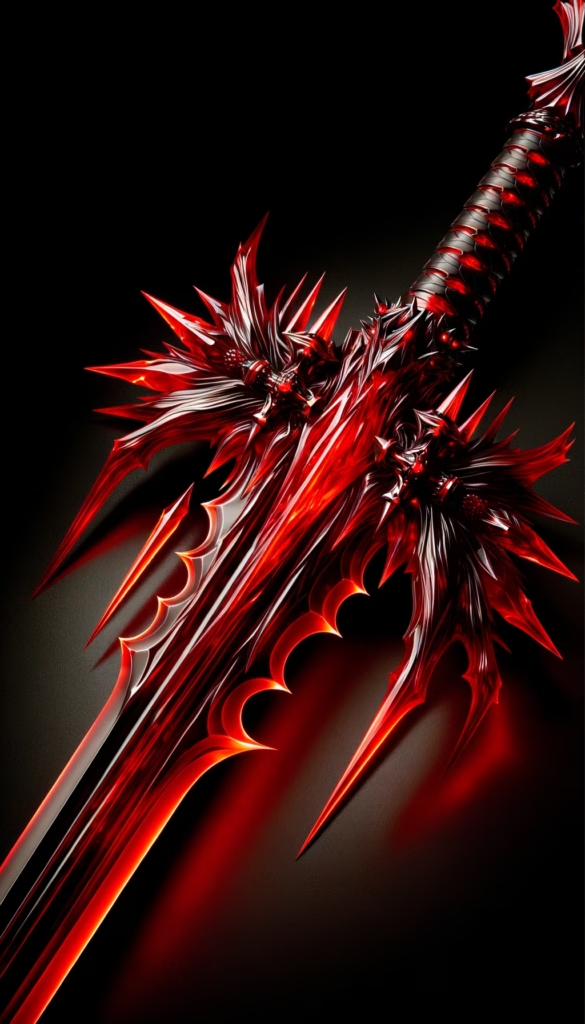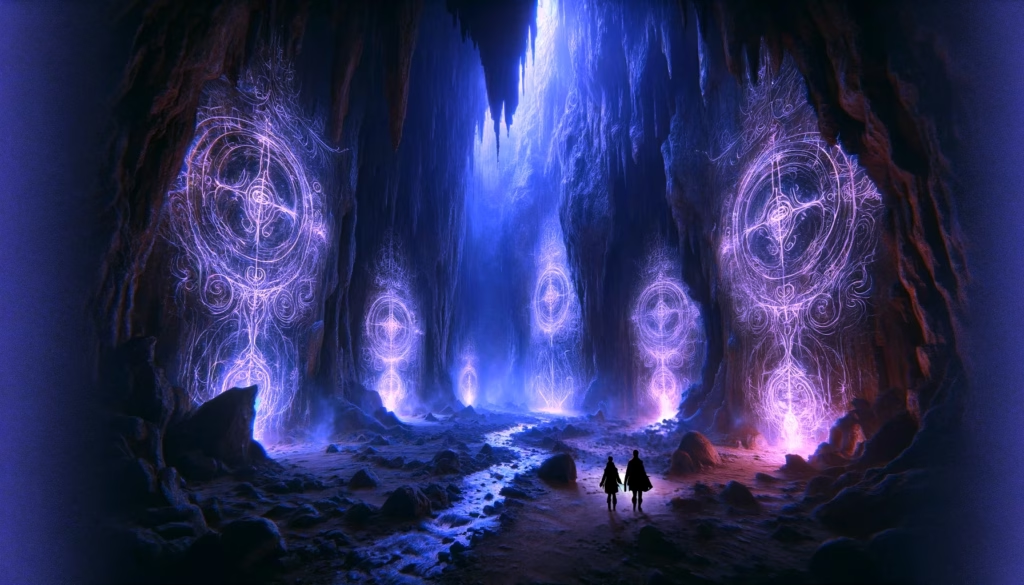The desert didn’t whisper—it waited.
Miles of scorched bone-dust sand stretched from one godless horizon to the next. Above it, the sky boiled in place, heat and color melting together like a cursed oil painting. Wind never lasted long here. Even storms got lost.
And that’s where the Bastards met.
A crab, a chimera, and a gnoll walked into the wasteland like the start of a bad joke. The punchline was buried beneath the dunes.

Craglor the Crab King was first to arrive—uninvited, undeterred, and dramatically overdressed. His shell gleamed like polished coral, battle-scarred and glinting beneath his absurdly large shoulder pauldron. He held a massive spear in one claw and a melon in the other.
“You’re late,” he announced to no one. “I’ve already named the dunes. This one’s Crabreach. That one’s Slightly Crabbier Reach. The third—”
“Shut up,” drawled a voice behind him.
The wind kicked up, carrying a thin trail of dust and cigarette smoke. The Gnoll Bastard strolled into view, longcoat flapping, revolver spinning idly in one clawed hand. His hyena snarl was half amusement, half warning.
“Sand’s loud enough without your shell clatterin’,” he said. “We got work. Not a vanity parade.”
Craglor narrowed his eyes. “Then where’s your ceremonial armor, mutt?”
The gnoll grinned wider, cocked his pistol with a snap of his wrist, and said, “Left it in your mother’s tidepool.”
Before fists could fly, the third arrived—not so much walking as coalescing. Chimera Bastard shimmered into view in a crackle of magic and dust, all three heads speaking at once in different registers.
“We’re here,” purred the feline head.
“We’re bored,” growled the goat.
“We’re hungry,” hissed the serpent.
Gnoll Bastard stepped back. “I told you I don’t travel with shapeshifters or triplets.”
“We’re not shapeshifters,” the goat snapped.
“We’re a disaster,” said the cat.
“And we’re the only ones who know where the first map shard is.”
That shut everyone up.
The legend had been unearthed in fragments, rumors bought with blood and foolishness.
An ancient weapon—older than the Bastardlands, older than even the gods that came before—was buried beneath the deadest part of the desert. Nobody remembered who forged it. Only that it had been torn apart and sealed across five clans. Each hoarded their piece like sacred venom.
And now, for reasons none of them liked, the pieces were stirring.
The weapon wanted to be found.
Chimera led the group into a sandstone ravine carved like a throat. The walls curved with unnatural symmetry, ribbed and humming faintly. Fossils blinked at them from the stone—fish, birds, maybe even old sins.
“Clan of the Mirage keeps the first shard,” said the cat. “They live in illusion, eat lies for breakfast, and guard their secrets with a thousand eyes.”
“Great,” muttered Gnoll Bastard. “Love a group that’s allergic to straight answers.”
They crept forward, weapons loose in hand. Craglor refused to creep—his natural gait was somewhere between “glorious strut” and “drunken siege tower.”
Around the next bend, the world bent with it.
They walked into a marketplace—alive, vibrant, full of color and chaos. Sand had turned to glass. Stalls lined the walkways. Perfumed air danced with music.
It was beautiful. And completely wrong.
Gnoll Bastard raised his pistol. “This is a memory.”
“No,” said Chimera’s snake, eyes glowing. “It’s bait.”
They were already surrounded.
Figures in silk and shadow flickered into existence—tall, thin beings with mirrored faces and blades made of glass. Their leader emerged from a plume of incense, her voice layered and echoing.
“Who comes to the Mirage Clan seeking truth?”
Craglor raised his claw. “Hi. I’m Craglor the Crab King. Local demigod. I brought fruit.”
The leader blinked. The illusion shimmered, but didn’t break.
“Do you have what we seek?” she asked.
Gnoll Bastard chuckled. “Depends. You lookin’ for sass, bullets, or bad decisions?”
Chimera stepped forward, heads in eerie unison.
“We seek the shard. And we’re willing to trade… or tear it from your broken illusions.”
That did it.
The air screamed.
The market shattered like glass dropped in a scream. Sand exploded upward. Illusions died, and the warriors stepped into truth: a hollow canyon of stone and bone, lit by phosphorescent lichen.
The Mirage Clan attacked.
They moved like reflections—impossible to track, always flanking. Craglor hurled his spear, caught two mid-air, and then yanked it back by the rope tied to his arm. Gnoll Bastard vanished in a roll, reappeared behind one, and fired a shot through a cracked mask.
It screamed. Its voice was his voice.
That gave him pause.
Too long.
Another sliced his arm. His blood hit the sand and hissed.
Behind him, Chimera sang.
Their song wasn’t lovely. It was teeth and fire and a low hum of war-magic. Goat summoned a wall of bone. Snake spat venom that turned one attacker to salt. Cat summoned laughter, and the enemy froze—forgetting what they were doing, why they were there, who they were.
The fight didn’t last long.
But what came after… did.
The leader of the Mirage Clan knelt at the edge of the canyon, blade broken, mask cracked. Her real face shimmered like glass trying to remember skin.
“You don’t know what you’re seeking,” she whispered. “The weapon isn’t a tool. It’s a… voice. A song no one should hum.”
Craglor picked up the map shard. It was carved into old coral—dry, but humming. Like it remembered the ocean.
“Songs are meant to be sung,” Craglor said.
Gnoll Bastard spat blood and holstered his gun. “Not all of ’em.”
Chimera whispered, all three heads in sync, “Too late.”
The shard pulsed in Craglor’s claw.
And in the windless desert around them… something hummed back.
The Sand Beneath the Claw

Part 2: The Teeth Beneath the Dunes
The desert changed after they took the shard.
Not the terrain—that stayed the same hateful mix of blistered rock and laughter-choking heat. But the air felt tighter. The horizon more watchful. Like the sand was no longer still but… listening.
“Tell me again why we’re not leaving it buried,” Gnoll Bastard growled, pawing sweat from his eyes as they trudged through sun-bent ravines.
“Because it wants to be found,” the Chimera purred.
The goat head sneered. “And because Craglor touched it.”
“And named it,” the crab added proudly. “Shardington.”
Gnoll stopped. “You named the apocalypse shard… Shardington?”
“I was thinking it could be a prince,” Craglor explained. “Like a royal heirloom. A weapon of legacy.”
“Heirlooms don’t whisper in your sleep, shell-boy.”
That night, they made camp in the shadow of a half-buried ribcage—something ancient and long-dead. The bones hummed with residual warmth, a cruel trick of the land. Chimera meditated. Craglor polished his spear. Gnoll chewed on a strip of dried lizard meat and pretended he wasn’t watching the shard flicker in the moonlight.
It sat between them, half-buried in sand, wrapped in old cloth. And it pulsed.
Gnoll leaned over. “Hey. Goat-face.”
The middle head opened one eye. “Do you want to die?”
“Later. What the hell is it saying?”
“It speaks in potential,” said the snake. “It tells you what you could be… if you stopped pretending to be something you’re not.”
“Sounds like my last three exes.”
Craglor didn’t laugh. He stared out at the stars and said quietly, “It told me I was chosen. That I’ve always been chosen.”
Chimera snorted softly.
Gnoll said nothing.
But the wind changed again.
And somewhere beyond the dunes, something began to dig.
By morning, tracks surrounded their camp—deep, clawed, and wrong. Not beast. Not human. Something in-between.
Gnoll sniffed the air. “Not scavengers. These things knew we were here.”
“Maybe they smelled fear,” said the goat.
Craglor raised his spear. “Or glory. Either way, they’re about to smell cooked crab.”
That wasn’t comforting.
Especially when the first one emerged.
It looked like a jackal carved from rust. Its bones jutted from thin, stretched skin, and its eyes were burning coals wedged into a skull that didn’t quite match its gait. It moved like a puppet dragged by something angry and old.
Behind it, more rose—at least a dozen.
And they didn’t attack.
They knelt.
Chimera hissed. “They’re not worshipping us.”
Gnoll’s trigger finger twitched. “They’re worshipping the shard.”
One of the creatures rose and spoke—not with a voice, but with a rasp of wind over broken rock.
“One piece has awakened. Three remain. The Choir stirs. The Crown cracks.”
Craglor frowned. “Is that prophecy or poetry? Because I don’t like either.”
“You carry the Voice,” the jackal rasped. “And it is choosing.”
Then it lunged.
The fight was brutal.
Craglor fought like a tsunami—his spear cleaving through bone and sand alike. Each swing was punctuated by shouts of his own name and title, as if battle were a royal debut.
Chimera spun spells and heads with equal ease. The cat summoned winds to knock creatures into stone. The goat set the sand itself ablaze. The serpent conjured visions that made enemies hesitate just long enough to die.
Gnoll fought dirty.
No magic. Just bullets, elbows, and rage. He bled from three places but never slowed.
The shard didn’t help.
It watched.
And when the last jackal-thing fell, it pulsed in time with the heartbeat of the dead.
They stood panting, surrounded by the twitching corpses of what shouldn’t have lived.
Gnoll glared at the shard. “It called them. Like a beacon.”
“No,” the cat whispered. “It chose them. Then rejected them.”
Craglor lifted it again. The pulse had grown. It was now warm in his claw, like it had a pulse of its own.
“I think,” he said slowly, “it’s looking for something.”
“Looking?” said the goat.
“For what?” asked the snake.
Craglor turned to face them, eyes strange and glittering.
“A host.”
Far to the north, beyond the Dagger Cliffs and the drowned city of Varuun, a blind oracle woke screaming in a house made of salt.
To the west, in a town already swallowed by sand, a rusted weather vane spun in circles against a dead wind.
And deep beneath the earth, something ancient opened its eyes… and remembered its name.
The Sand Beneath the Claw
Part 3: The Host and the Hollow

The shard spoke to them again.
Not in words. Not even in whispers.
In dreams.
Gnoll woke gasping, clawing at the dry earth beneath his bedroll. His teeth ached from grinding, and his holster was half-unbuckled, as if he’d reached for his gun in his sleep. His dreams had been full of sandstorms that screamed, dunes shifting into open mouths, and something just beneath the surface begging him to bleed.
Across the firepit, Craglor sat upright, unmoving.
Staring into the flames.
“Did it talk to you?” Gnoll asked, voice low.
Craglor nodded once.
“What’d it say?”
“That it needs me.”
A long pause.
“Do you believe it?”
“I want to,” the crab said, quietly. “More than I should.”
The Chimera didn’t sleep. Not anymore.
Instead, it watched.
At some point in the night, it had drawn a perfect circle in the sand around the shard. A ward, of sorts. Old magic, instinctual and raw. The serpent’s tongue flicked in agitation.
“It’s dreaming with you now,” the goat head said to Craglor. “Which means it’s already inside.”
“Inside what?”
“All of us.”
The cat spoke next, voice cool and measured: “We need to find the other pieces before it does.”
The map they’d taken—half-burned, half-lied-about—pointed them to a sunken ruin called Kesh.
No one remembered building Kesh.
No one alive.
It was a city swallowed by the dunes after it betrayed its gods. Or perhaps after the gods betrayed it. The details changed with every telling.
All that remained were broken spires and the sound of weeping wind.
They arrived by noon.
And the wind stopped.
The entrance to Kesh was half-collapsed, a stairwell jutting from the sand like a snapped jawbone. As they descended, the walls grew wet, cold, and alive with carvings that slithered when you weren’t looking.
The shard pulsed brighter in Craglor’s claw.
And then the door opened itself.
They entered a throne room of silence.
Stalactites hung like teeth. Black moss crawled up golden statues. A throne of petrified wood waited at the far end, vines wrapped around it like a crown of thorns.
And on the throne…
…was a corpse.
Or what should have been.
It still breathed.
Barely.
The figure was tall, desiccated, robed in sun-stained silk. Its eyes were sewn shut with silver thread. Its arms were crossed—but missing both hands. A brand burned into its chest read in dead script: “I Held the First Voice.”
Gnoll raised his gun. “Tell me that’s not alive.”
The goat sniffed the air. “No… but it’s listening.”
Craglor stepped forward. The shard throbbed in his grip.
The corpse twitched.
Then spoke.
“Who comes with the seed?”
Craglor didn’t hesitate. “I do.”
“Then you carry the doom of teeth and sand.”
Gnoll cocked his revolver. “Love this part.”
Suddenly the floor fell away.
Not literally—but to the mind.
The room dissolved into a vision: the sky black with wings, the earth bleeding through its own cracks, something rising from beneath the world that wore a thousand faces, each more honest than the last.
They saw the Choir.
What had once been one.
Split across time, across bone, across echo.
A weapon built from belief.
And the shard was a piece of its voice.
They snapped back to reality, panting, cold.
The corpse had crumbled.
In its place, another shard.
Larger.
Older.
Buzzing with need.
Chimera reached for it.
But it burned him.
Gnoll tried next.
It screamed inside his skull.
Only Craglor could touch it.
Only he could hold it.
And when he did—something inside him shifted.
Later, as they made camp far from the ruin, Gnoll approached Craglor by the fire. “Be honest with me. You still in there?”
Craglor didn’t answer.
Just stared at the twin shards in his palm.
They pulsed in sync. Then in rhythm. Then… in harmony.
The wind picked up.
The sand shifted.
And from the darkness came a voice made of three:
“The Host has taken form.”
The Sand Beneath the Claw
Part 4: The Map That Breathes

The wind didn’t howl. It chanted.
Three notes. No mouth.
Gnoll sat with his rifle stripped and open across his lap, oiling the barrel like a ritual. Not because it needed it—but because he did. His hands wouldn’t stop shaking.
Across the fire, Craglor slept with his claws clamped shut, like the shards inside him might escape if he loosened his grip.
They might.
Chimera stood a few paces away, staring into the desert, all three heads silent.
Finally, the goat murmured: “The wind is lying to us.”
They made for the next shard by dawn.
It wasn’t buried, hidden, or cursed like the others.
It was worn.
Etched into the back of a living creature.
They found it by accident—following tracks that led to a herd of bone-thin beasts grazing near a dried oasis. One of the animals stood taller than the rest, its back hunched with runes that moved when stared at too long.
Gnoll raised his gun. “That’s not natural.”
“No,” the cat head replied. “It’s chosen.”
The beast looked up.
And ran.
The chase was messy.
Craglor moved like a tidal wave of muscle and fury, but the desert was faster. Gnoll fired a warning shot that only seemed to make the thing run harder. Chimera leapt rock to rock, but even with three minds, the quarry was unpredictable.
They finally cornered it near a cliff’s edge—pinned against the horizon.
The beast didn’t scream.
It sang.
Low, rattling tones, like dry lungs humming a funeral hymn.
Then it collapsed.
Dead.
No wounds. No visible trauma.
Just… finished.
The rune on its back peeled off like skin.
Floating mid-air.
Chimera hissed.
Gnoll swore.
Craglor stepped forward—and it entered him.
No pain.
Just weight.
He staggered, knees sinking into sand that suddenly felt a mile deep. His eyes rolled back.
He saw everything.
A map.
Not of terrain.
But of memory.
The pieces weren’t just directions—they were intentions. Thoughts. Buried wishes. Every shard was part of a weapon not forged but willed into being.
The Choir didn’t speak to command.
It spoke to convince.
It sang to create belief—and belief made the world reshape itself.
That was the truth buried beneath sand and shard.
Not a sword.
A story.
And Craglor was becoming its voice.
He awoke to the barrel of Gnoll’s pistol an inch from his eye.
“Say something only Craglor would say,” Gnoll growled.
Craglor blinked.
“…My traps are spectacular and my calves are carved from heaven’s bone.”
Gnoll lowered the gun. “Okay. That checks out.”
Chimera paced in a tight circle. The cat head spoke: “Three shards. Three echoes. Three voices.”
“They’re not just calling to Craglor anymore,” the goat added.
“They’re calling through him,” finished the serpent.
Gnoll crouched by the fire. “What happens when he hears the full song?”
Craglor didn’t answer.
He didn’t need to.
Because far off, across the dunes, a note rose into the sky—haunting and full of promise.
The final shard had started singing.
The Sand Beneath the Claw

Part 5: When the Choir Breathes
The desert was silent.
Not quiet—silenced. No wind. No distant calls. Not even the sound of their own footsteps.
Craglor, Chimera, and Gnoll crossed the final dune to find the shard not hidden, but waiting.
A single obelisk jutted from the sand like a fossilized finger. It hummed—not through sound, but vibration, like a tuning fork buried in thought.
Craglor approached.
“This is it,” he said.
His voice echoed, though none of them spoke.
The obelisk split open like a cracked tooth.
Inside: a hollow void. A throat carved from stone, leading down into the dark. Steps worn smooth by time—or memory.
Chimera sniffed the air. “It doesn’t reek of magic,” said the cat.
“No,” the goat corrected. “It reeks of regret.”
Gnoll cocked his rifle. “We going in?”
Craglor didn’t wait for an answer.
They descended for what felt like hours.
The stone grew warm.
Then wet.
Then alive.
Veins of light pulsed along the walls, matching Craglor’s heartbeat. The glyphs from the previous shards glowed faintly on his skin, trailing down his arms like vines tattooed from inside.
Chimera lagged behind.
Something was resisting.
Gnoll noticed first. “What’s wrong?”
The snake head hissed, “We’re not supposed to be here.”
“Since when do we listen to fate?”
“We don’t,” the cat muttered, “but it does.”
They reached the chamber.
It wasn’t a forge. Not a vault.
It was a lung.
A living thing, breathing shallow beneath layers of stone and song. At its center, suspended in strands of fossilized light, floated the final shard—larger than the others. A fragment of bone. Or horn. Or something older.
Craglor stepped forward.
And it spoke.
“You are the sum of disbelief.”
“You walked without knowing why.”
“You searched without knowing what.”
“Now you are the mouth. The claw. The story.”
“Will you sing us free?”
Craglor’s claws closed around the shard.
The chamber exhaled.
The Choir awoke.
They didn’t see it—not at first.
But the world changed.
Outside, dunes shifted into spirals. Stars blinked into strange constellations. Time moved differently.
Gnoll staggered. “What did you do?”
Craglor turned, eyes glowing faintly gold.
“I didn’t do anything. I listened.”
Chimera dropped to all fours. “That wasn’t a weapon.”
“No.”
“It was a key.”
“No.”
Gnoll raised his rifle again. “Then what the hell was it?”
Craglor smiled, but it wasn’t his.
“It was a voice.”
The Choir spoke again, this time through all three Bastards.
Chimera gasped—each head screaming in unison before collapsing. Gnoll held out for three more seconds before dropping his weapon and grabbing his ears.
“The sand remembers the gods you buried.”
“The blood remembers the shape of old names.”
“The desert was never empty.”
When the screaming stopped, only Craglor stood.
The chamber was gone.
The sun returned.
They were alone in the sand again—except they weren’t.
Craglor looked at the sky, and the sky nodded back.
Gnoll rose slowly. “So… are you still you?”
Craglor shrugged. “Mostly.”
“Mostly?”
“Enough to keep the story going.”
Chimera’s goat head groaned. “That’s ominous.”
The cat muttered, “I liked it better when we were chasing maps and punching sand demons.”
The snake stayed silent. Watching Craglor.
They walked for a while.
Nothing chased them.
Nothing guided them.
Until, finally, Gnoll asked:
“So what now?”
Craglor grinned.
“The Choir wants us to share the story. One shard at a time.”
Chimera frowned. “And what happens if we don’t?”
Craglor didn’t answer.
But in the silence, the sand began to hum again.
A single note.
Growing louder.



